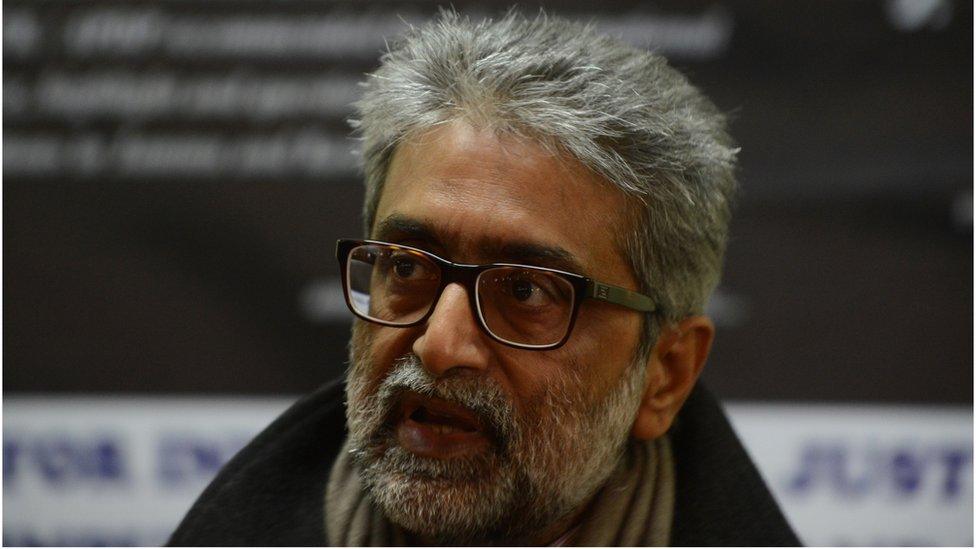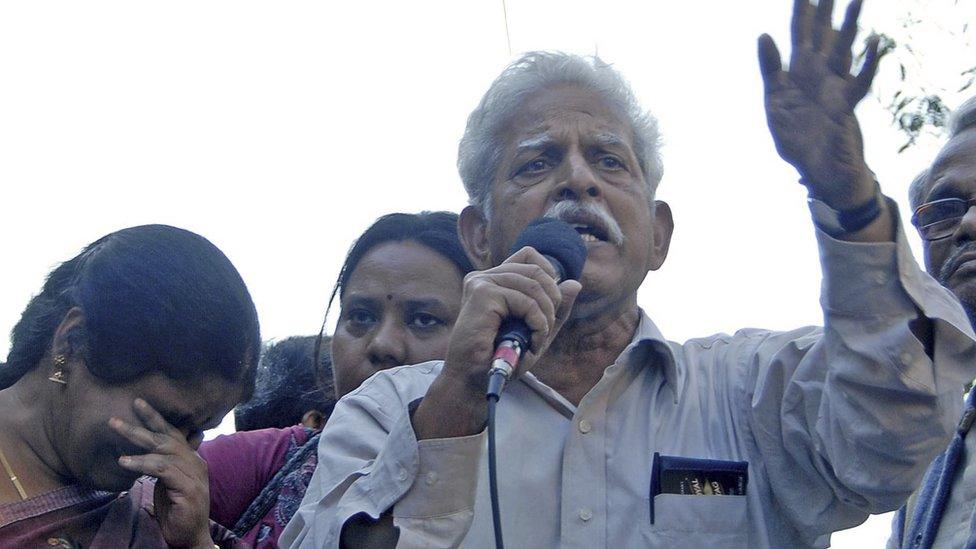Top Indian activists held over caste violence
- Published

Gautam Navlakha is one of the activists who has been arrested
Five prominent Indian activists have been arrested in connection with caste-based violence in the western state of Maharashtra earlier this year.
Sudha Bharadwaj, Gautam Navlakha and Varavara Rao were picked up from their homes in different Indian cities.
Police in Pune later confirmed that Vernon Gonsalves and Arun Ferreira were also under arrest.
The homes of other leftist lawyers and scholars were also raided as part of an investigation into the violence.
Five others with Maoist links were arrested in June in connection with the same investigation.
Police say that the activists incited Dalits (formerly untouchables) at a large public rally on 31 December 2017, leading to violent clashes that left one person dead.
Dalit groups had gathered in the city of Pune to commemorate the 200th anniversary of the Battle of Koregaon. Dalits regard the battle - in which they fought alongside British colonial forces to defeat an upper-caste ruler - as the first battle against caste oppression.
But a day after the rally, clashes broke out between Dalits and right-wing groups, who reportedly opposed the celebrations.

Activist and poet Varavara Rao was picked up from his home in the southern city of Hyderabad
Critics have said the raids are a "witch hunt" against those who have challenged the ruling Hindu nationalist Bharatiya Janata Party (BJP).
Booker Prize-winning author Arundhati Roy said: "Officials are punishing those who fight for justice and are against Hindu dominance."
"Instead of arresting those who publicly lynch people, the police are arresting lawyers, poets and writers who fight for Dalit rights. This shows which direction India is headed," she told BBC Telugu.
Amnesty International said the arrests raised "disturbing" questions about whether they were politically motivated.
"India is witnessing a massive crackdown on lawyers, journalists, activists and human rights defenders, who have been critical of the state," the rights group said.
"The government should protect people's rights to freedom of expression, association, and peaceful assembly instead of creating an atmosphere of fear."
Others, including notable historian Ramachandra Guha, took to social media to condemn the arrests.
Allow X content?
This article contains content provided by X. We ask for your permission before anything is loaded, as they may be using cookies and other technologies. You may want to read X’s cookie policy, external and privacy policy, external before accepting. To view this content choose ‘accept and continue’.
Allow X content?
This article contains content provided by X. We ask for your permission before anything is loaded, as they may be using cookies and other technologies. You may want to read X’s cookie policy, external and privacy policy, external before accepting. To view this content choose ‘accept and continue’.
Allow X content?
This article contains content provided by X. We ask for your permission before anything is loaded, as they may be using cookies and other technologies. You may want to read X’s cookie policy, external and privacy policy, external before accepting. To view this content choose ‘accept and continue’.
Police told the BBC that their investigation was ongoing and had led them to search the homes of scholars and activists in Delhi, Hyderabad in the south, Mumbai in the west and Ranchi in the north.
Sagar Gonsalves, the son of activist Vernon Gonsalves, told the BBC that the police had searched their home for more than five hours.
"They searched our entire house, checked our pen drives and took the hard disc from the computer and our mobile phones. They also took books which are easily available," he said. "We feel helpless in such a situation."
- Published2 August 2016
- Published20 January 2016